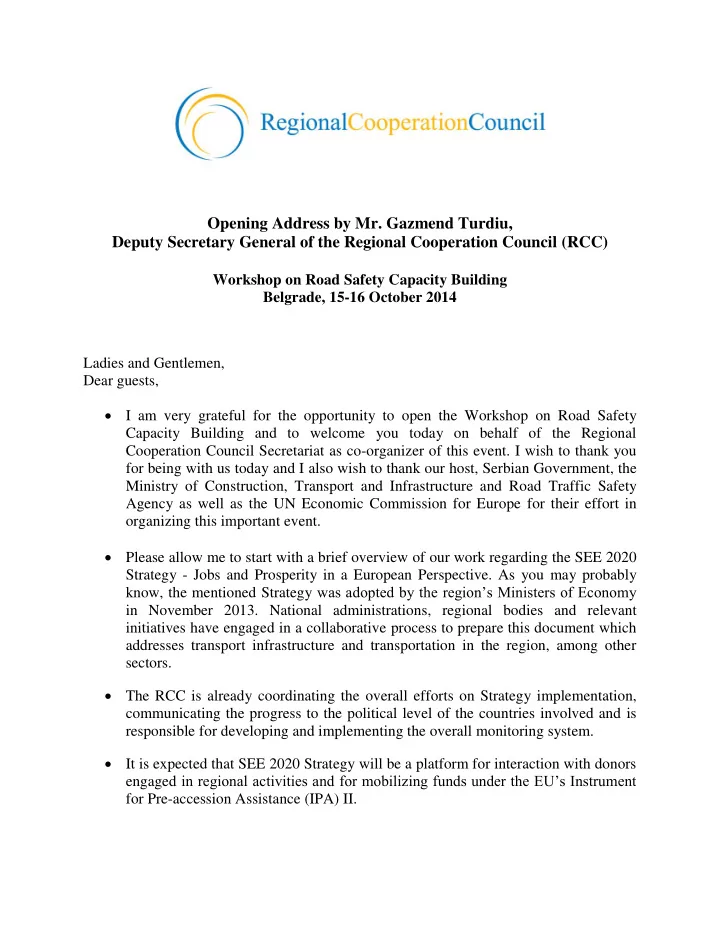

Opening Address by Mr. Gazmend Turdiu, Deputy Secretary General of the Regional Cooperation Council (RCC) Workshop on Road Safety Capacity Building Belgrade, 15-16 October 2014 Ladies and Gentlemen, Dear guests, I am very grateful for the opportunity to open the Workshop on Road Safety Capacity Building and to welcome you today on behalf of the Regional Cooperation Council Secretariat as co-organizer of this event. I wish to thank you for being with us today and I also wish to thank our host, Serbian Government, the Ministry of Construction, Transport and Infrastructure and Road Traffic Safety Agency as well as the UN Economic Commission for Europe for their effort in organizing this important event. Please allow me to start with a brief overview of our work regarding the SEE 2020 Strategy - Jobs and Prosperity in a European Perspective. As you may probably know, the mentioned Strategy was adopted by the region’s Ministers of Economy in November 2013. National administrations, regional bodies and relevant initiatives have engaged in a collaborative process to prepare this document which addresses transport infrastructure and transportation in the region, among other sectors. The RCC is already coordinating the overall efforts on Strategy implementation, communicating the progress to the political level of the countries involved and is responsible for developing and implementing the overall monitoring system. It is expected that SEE 2020 Strategy will be a platform for interaction with donors engage d in regional activities and for mobilizing funds under the EU’s Instrument for Pre-accession Assistance (IPA) II.
I will use this opportunity to reiterate that road safety has been identified as one of our priorities in the Regional Cooperation Council’ s Strategy and Work Programme 2014-2016. Furthermore, the improvement of road safety standards at regional level has been recognized as one of the SEE 2020 Strategy key actions to which the RCC will pay due attention in the coming period. The RCC Secretariat has already organized a number of conferences that tackled the issue of road safety and we intend to continue working on this matter in order to provide conditions for the follow-ups. In this field, the RCC puts focus on encouraging and promoting a multisectoral approach alongside the inclusion of different level stakeholders such as academia, private sector stakeholders, professional associations, non-governmental organizations and the media. When it comes to the SEE region, the road safety situation is worrying with the continuous increase of casualties. Some countries were successful in stopping the increase in road safety indicators or in reducing the total number of accidents, but overall risk indicators are still far above the EU average. Some efforts to improve this situation have been made nationally, but there has been no coordinated regional initiative. The general impression, given the statistics of casualties in the region, is that it shows a slight improvement. However, the region is significantly lagging behind the best performing EU countries, requiring more focused attention to the road safety critical issues in the future. It is obvious that it is a critical issue leading to deaths and injuries, and burdening the economy with the costs of in some cases up to 2% of annual GDP. In this context, the European Commission has adopted challenging plans to reduce the number of road deaths on Europe's roads by half in the next 10 years having in mind that road traffic casualties result in a heavy social, economic and financial burden that can be prevented only with a strong political will, commitment to specific targets and measures which need to be taken in a coordinated way. To that aim and depending on the level of development of road safety management system, it is necessary that responsible authorities in each country adopt number of specific measures in their planning process, such as: higher vehicle safety standards, improving the quality of road infrastructure, extending the traffic regulations integrated with proper budget allocations, raising public awareness and providing education in this area. All this should lead to the improved road safety standards as well as to the overall situation in the region.
In order to enable grater development in road safety area, it should be demonstrated that much can be accomplished through public-private partnerships where participating organizations contribute resources, expertise and relationships in a non-commercial endeavour. Joint access to the EU funds could be used as a way to better coordinate all necessary actions at the regional level. Ladies and Gentlemen, In light of the 2011-2020 Decade of Action for Road Safety, we should join our efforts towards achieving the EU 2011-2020 goals, and therefore, this is an excellent opportunity to be informed by the renowned experts about the possible approaches and difficulties in this respect and to share experiences and good practices with representatives from the SEE region and beyond. I will reiterate that road safety development has become a top priority for national and local policy-makers, which should not be treated as a side-issue to be dealt only by transport ministers. We all need to start treating it as a national emergency. Still, with joint continued efforts, we should work together in the decade to come in order to save millions of lives and start to make roads safer for all of us and generations to come. Finally, RCC remains very much committed to providing the necessary political support in the process of raising awareness on road safety critical issues and to contribute to the promotion of regional approach towards the uniform application of EU road safety legislation as well as to facilitate access to the available EU funding instruments. I wish you a successful and productive workshop. Thank you.
Recommend
More recommend